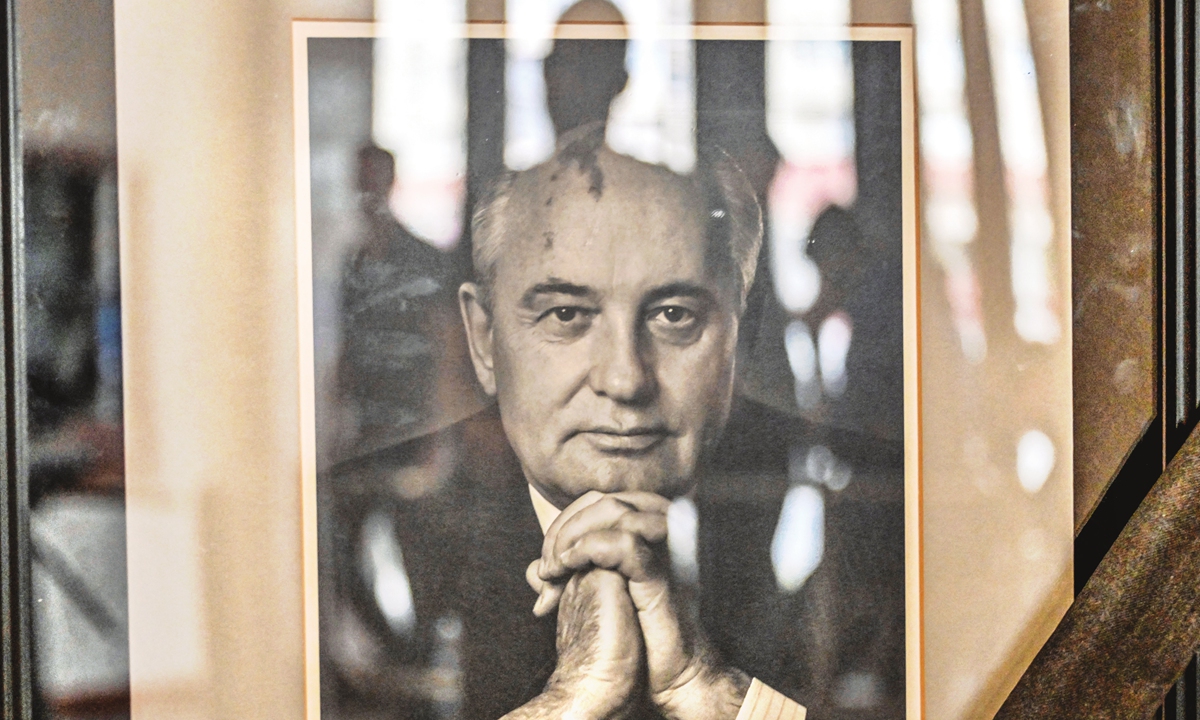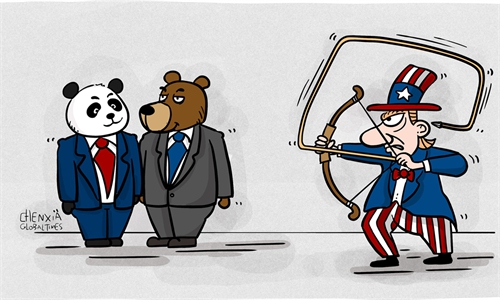Chinese observers express mixed feelings about Gorbachev, draw lessons from his immature policy of cozying up with West

A picture shows a portrait of the last leader of the Soviet Union Mikhail Gorbachev, displayed in his memory in his office at the Gorbachev Foundation headquarters in Moscow, on August 31, 2022. Photo: AFP
Chinese observers on Wednesday shared the mixed feeling about controversial politician Mikhail Gorbachev's passing on Tuesday. The Chinese Foreign Ministry also extended condolences over his death. While the Western politicians praised his historical role for bringing his country closer to the West and ending the Cold War, Chinese observers considered him as a tragic figure who catered to the US and the West without principle, made severe mistakes in judging the international situation, and caused chaos in domestic economic order, all of which are reminder to other countries to stay cautious about any attempt of "peaceful evolution" by Western forces.In hindsight, Gorbachev is naïve and immature, some observers said, and he represented a certain historical period of USSR, later Russia, shifting between the paths of "seeking an independent way" and "embracing the West." Blindly worshipping the Western system made the USSR lose independence, and the Russian people suffered from the political instability and severe economic hardship, which China considered a major warning and lesson to draw experience from for its own governance, observers said.
Gorbachev has died on Tuesday at the age of 91, TASS reported. He was the last Soviet president, resigning on December 25, 1991 when the Soviet Union ceased to exist at the same time.
Russian President Vladimir Putin offered his deepest condolences over the passing of Gorbachev, Russian media reports said, citing Kremlin Spokesperson Dmitry Peskov.
Gorbachev made active contributions to the normalization of relations between China and the Soviet Union. We offer condolences over his passing and extend sympathy to his family, Zhao Lijian, spokesperson of the Chinese Foreign Ministry, said on Wednesday during a routine press conference.
UN Secretary-General Antonio Guterres also extended his condolences, calling Gorbachev a statesman who changed the course of history and "did more than any other individual to bring about the peaceful end of the Cold War," according to media reports.
In 1985, Gorbachev became general secretary of the Central Committee of the Communist Party of the Soviet Union.
During his time in office, Gorbachev aimed to re-energize the stalled Soviet economy, which was riddled with inefficiency, overblown defense spending and creeping corruption. He called for urgent reorganization and modernization, but soon expanded his reform to the political and social structure of the whole nation, RT said.
The policy of "perestroika" (restructuring) was announced in 1986 as an attempt to reorganize the economy, and another policy proclaimed "glasnost" (openness) with the aim of bringing transparency into society. He also proposed a constitutional change to move to a presidential system and created a new political body called the Congress of People's Deputies, according to the Russian media reports.
Gorbachev's foreign policy, also known as the "new thinking," marked a period of significant improvement of relations between the Soviet Union and Western countries, replacing the era of Cold War hostilities, and in 1986, he announced plans to withdraw Soviet troops from Afghanistan, but it took three more years to complete the pullout.
Controversial figure
Gorbachev was "young, energetic and striving for changes," who actively implemented those changes in a time of stagnation, which is true but not last for long, Russian news outlet RIA Novosti said on Wednesday. Gorbachev became and remained to the end of his life "the object of the burning hatred of a huge part of his fellow citizens, who placed on him the main responsibility for what they had to endure," according to the media report.
However, the first and the last Soviet president had a completely different image in the Western world, as he won widespread acclaim in the West.
On Wednesday, some Western officials and netizens shared some highlights of Gorbachev interacting with Western politicians such as a photo of him with then US President Ronald Reagan and then Vice President George HW Bush by the World Trade Center, and his interaction with then UK Prime Minister Margaret Thatcher who considered him as a man "one could do business with."
One of the most symbolic moments - Gorbachev starring a 1997 Pizza Hut commercial, signaling Russia's opening up to foreign business, was widely shared by netizens on Wednesday.
When Western media outlets came up with feature stories commemorating Gorbachev, some compared his legacy with Putin's policies toward the West, especially Russia's military operation in Ukraine. The New York Times said "Putin sees the Ukraine war as part of his battle to undo Gorbachev's legacy," and Boris Johnson, UK Prime Minister who resigned in July, said in a tweet comparing Putin with Gorbachev, urging him to stop military operation in Ukraine.
Some Chinese observers referred to Gorbachev as "the one bringing ruin upon himself." Over the past decade, Russian top leader Vladimir Putin has been learning from the lessons of the Soviet leader in the 1990s, adhering to the country's own path, observers said.
"Gorbachev made compromise with the West by accepting Western ideologies, turning against the socialist system but now Putin put the national interests above all," Zhang Hong, an associate research fellow at the Institute of Russian, Eastern European and Central Asian Studies of the Chinese Academy of Social Sciences, told the Global Times on Wednesday.
Russia walked down a path where it had to bear some pain and then returned to its own path of development, which is not blindly following the path of the West, Zhang said.
The topic of passing of the former Soviet Union leader also drew huge public attention on Wednesday on Chinese social media with a total of 770 million times of reading relevant posts on Chinese Twitter-like Weibo with over 80,000 times of discussion.
Lessons for other countries
The partial democratization of Soviet society under Gorbachev led to a surge in nationalist and anti-Russian sentiment in most of the 15 Soviet republics, and the Soviet Union collapsed with dramatic speed during the latter part of 1991 with the former Soviet leader facing tremendous criticism, most at home.
"During the period he was in the office as the top leader of the USSR, he made severe mistakes in judging both domestic and international situations, and the facts proved that the policies rolled out were catastrophic to the country," a Beijing-based veteran expert on international affairs who spoke on the condition of anonymity told the Global Times on Wednesday.
These mistakes caused the chaos in domestic economic order, making the public lose confidence in the country's system; instead of safeguarding national interests, the foreign policy was swayed by the US-led West, the expert noted. Such immature governance left long-lasting pain for Russia until today, he said.
As a lesson for China's own governance, the Communist Party of China upholds its own socialist path with Chinese characteristics, underscoring political maturity and sobriety.
"Gorbachev was deceived by the West. At the critical moment, he could not save the USSR nor the Communist Party of the Soviet Union," Wang Yiwei, director of the Institute of International Affairs at the Renmin University of China, told the Global Times on Wednesday.
China's opening-up is based on adhering to the four cardinal principles, including upholding the socialist path and upholding the leadership of the CPC, rather than seeking Westernization like the USSR, Wang said.
Despite that Western media outlets are trying to pay tribute to Gorbachev while demonizing Putin, it's easy to find out from the public records that Gorbachev believed that the US-led West was the part that instigated the Russia-Ukraine conflicts.
After the collapse of the Soviet Union, the US was "hit in the head by arrogance," which led to the idea of NATO's expansion and led to the oblivion of the principles of collective security, but it is not too late to resume dialogue, Gorbachev told RIA Novosti in an interview in December 2021.
The root cause of Russia's military operation in Ukraine could be traced back to the Gorbachev's policies, especially when he made compromises without principle in discussing the Germany's reunification with Europe and the US, leading to today's tragedy, the Beijing-based expert noted.
"The lesson China should draw from such tragedy is to remain vigilant toward the Western forces conducting 'peaceful evolution' in other countries, as no matter it's Western ideas or plans, Gorbachev had catered to the West without principle, which also weakened the Soviet Union's influence and strength in international affairs," he said.


